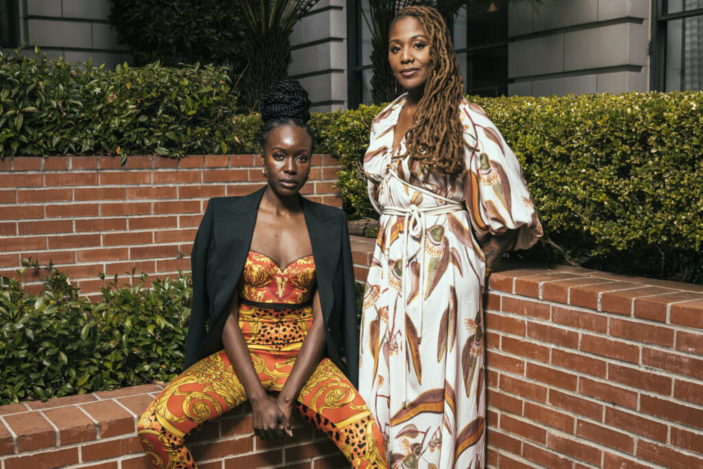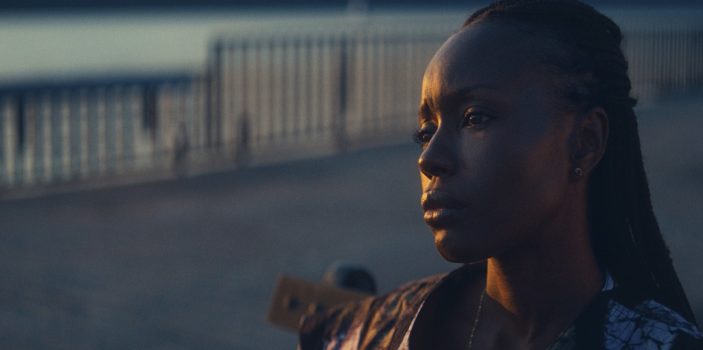
In the psychological horror fable of displacement Nanny, Aisha (Anna Diop), is a woman recently emigrated from Senegal and hired to care for the daughter of an affluent couple (Michelle Monaghan and Morgan Spector) living in New York City. Haunted by the absence of the young son she left behind, Aisha hopes her new job will afford her the chance to bring him to the U.S., but becomes increasingly unsettled by the family’s volatile home life. As his arrival approaches, a violent presence begins to invade both her dreams and her reality, threatening the American dream she is painstakingly piecing together.
The first horror film to win the Sundance Film Festival Dramatic Grand Jury Prize and only the second time this honour has been bestowed upon a Black female director, Nanny is a genre-bending film that blends psychological horror with culturally relevant issues of social identity, including race, gender, and socioeconomic status.
As its global release on Prime Video arrives (you can read our review here), Peter Gray spoke with both writer/director Nikyatu Jusu and lead actress Anna Diop about the deep, personal connection they each have to this project, how Anna drew inspiration from her own mother when researching her role, and which Australian filmmaker gave Nikyatu the insight into navigating the horrors of her story.
Anna, it seems like horror is a genre that’s attracted to you. Have you found it surprising to find yourself in as many genre films as you have?
Anna Diop: I have. I don’t know what it is about me that is speaking to the genre, but, you know, I’m just always down to be working with filmmakers that are creatively this intelligent and original and exciting. It just so happens that those filmmakers are making horror, and I’m all good with that.
I went into this film knowing nothing. I read the synopsis and naturally found it intriguing. It took me to places I was not expecting. And as a critic I love being surprised, because predictability is so boring. What was your initial reaction when you read the script?
Anna Diop: Aisha is a character that’s very personal to me. She shares many parallels to my own mother, and many parallels to me too, but my mother left Senegal for the United States when I was five-years-old, and she did it for the same reason (as my character), which was to help build a better life for me. I was stunned when reading a character that in many ways brought my mother to life. On top of that, the script is just so captivating. By the time I read it, the whole industry had been talking about it. It was on the 2019 blacklist, and people were really excited about it.
I read it and I completely understood why. As a script and as a story, it was just a captivating, incredible (read). And then on top of that, it was telling the story of someone that I’ve known my whole life, and I’ve lived my whole life not really seeing (this character) depicted in television or film. I hadn’t seen this celebration or amplification at all, so I was just blown away.
Nikyatu, I understand that this was almost an 8-year process in fully realising this film. I know, for me personally, my sanity is key when writing. Was that part of what paused this project? And what was it that ultimately inspired you to complete it?
Nikyatu Jusu: Thank you for that question. This is kind of a new way into the long journey of making it, so yeah, as a writer and director, you’re so close to the material. Even in film school you learn not to edit your own film, because you’re too close to the material. You get somebody else (with) fresh eyes. On top of that, it’s a personal story. There were times where I literally felt like I was grieving my parents in real time. Both of them were alive (when I was writing), my dad is now gone, but I was grieving them in real time (so) I had to take a break. It was truly a love letter to both of them in different ways.
The lore and the mythology allowed me to have a distance, even in the creative process, from a story that was very aligned with my mother’s story. But yeah, writing is hard. It’s lonely. I love co-writing. I’m co-writing one of my next projects with another brilliant screenwriter. And then another project (has) a whole other screenwriter, and I’m just directing. I love having a healthy distance. I think I wrote as a means to put myself in the director’s seat, because writing is the most accessible and cheapest part of this process for creators.
I wrote something I knew that only I could direct so that it wasn’t a situation where I wrote this brilliant script and they were like “This is brilliant, we want to finance it, but we’re going to hand it off to Quentin Tarantino.” God forbid. I love him, but this is not his film. I knew I had to write something that undeniably only I could direct, but I’m also not one of those people who romanticises the process of writing. I’m pretty good at it, but it’s really hard for me. It’s lonely. I overthink every word, every sentence, even in a script. I love Eric Heisserer, who wrote Arrival. The way he approaches screenwriting is really poetic. I love screenwriters who still have artfulness. Not just, like, “The boy walks up the steps. The boy opens the door.” That’s one way, but I love screenwriters who pour their artfulness into the actual screenplay.
The way Aisha is portrayed is very relatable, in that she’s one person in a professional capacity, and then another in her personal life. We’re all two people. essentially. I love that we saw that dynamic. Was your mother who you drew inspiration from with this role?
Anna Diop: Yeah. My mother worked as a nanny, so seeing her navigate herself in those spaces versus when she’s at home, and she’s calling my aunts back (in Senegal) and she’s telling them how hard America is and how exhausted she is and how this person doesn’t pay her, yada, yada, yada…So seeing that definitely helped inform the performance. But also, like you said, each of us kind of put on a different hat and play, for lack of a better term, different roles, depending on who we’re in front of and what environment we’re in. I just reflected on myself and how I navigate professional spaces versus when I’m with my friends versus when I’m with someone that I have a crush on versus, you know, when I’m taking care of children. It was fun to portray this gamut of experience.

It could be a mentality that I’m reading too much into regarding Aisha, but as you’re fleshing her out, was it a thought of yours to explore that feeling of basically resentment in having to raise a child that isn’t her own?
Anna Diop: Definitely, yeah. Especially as the film continues and the time between her seeing (her son) becomes longer and the stresses become heavier. The family becomes more precarious between Amy and Adam (and) that loneliness becomes greater, especially when exploring how that shows up in her relationship with Rose. It was something I thought a lot about.
As you said that the horror genre often brings out originality, and it feels like you can’t get more original than this. How was it working with Nikyatu? And did you find a difference in working with a black, female director?
Anna Diop: Yes, there is. For one, there’s safety in it. I knew that I would be properly lit. I knew that I would be angled in a way that was flattering, or that every aspect I would really be seen. To be properly directed, lit, or be shot (correctly) isn’t something I’ve experienced a lot in my career. I think being lit properly is quite challenging for a lot of black actors. DP’s don’t always care to spend the time to learn (how to shoot black actors), but knowing I would be taken care in that way made it a more comfortable project to shoot. It’s more relaxing. I just felt safer. I just knew I was taken care of in a way that is lost when I’m working with other people.
As a film that’s described as a “supernatural horror film”, it truly is so much more than that. This is very much a love letter to working mothers. Was that an ingredient when writing the story that you found blended with the horror elements quite organically?
Nikyatu Jusu: I love that you mentioned (that). Whether your mother was a domestic worker or an immigrant woman, or just a strong mother that you’ve seen sacrifice for your own betterment, there are many ways in (to Nanny) and I think about Jennifer Kent’s The Babadook. It’s one of my favourites. I’m so glad I can finally talk to an Australian about an Australian filmmaker I love (laughs). The Babadook is similarly about a single mother navigating grief and guilt and the stress of being this single mom, but it’s entrenched in horror. Horror is a vehicle through which we navigate her story with her child, and I love that it has a human, universal story at the heart of it. Looking at films like The Babadook and Jennifer Kent’s work gave me permission to explore my film in a similar way.
Obviously there a lot of themes within the film that I can’t comment on, but I was raised by a single mother, so I certainly related to that side of the narrative. I really have to take my hat off to everybody involved in this film. I saw it all the way back at Sundance, and I was so happy it got a physical screening at TIFF, and I’m glad that everyone can now see this on Prime, because everyone needs to see this film. We really need more films like this that tell these stories.
Anna Diop: You are going to make me cry on this (interview). Thank you so much. It means so much. I hope you don’t take this the wrong way, but you, as a white man saying this makes me have so much hope for humanity that you can appreciate and recognise this story, and find the parallels within your own life. It makes me feel very connected and very happy. Thank you for saying that.
Nikyatu Jusu: I love that you said that. The beauty of storytelling is that the point is to try to get to a multitude of people to see the world through your protagonist’s gaze. Even if it’s only for 90 minutes. With you, it means my job is done, and that’s really affirming. Thank you.
Nanny is now streaming on Prime Video.
